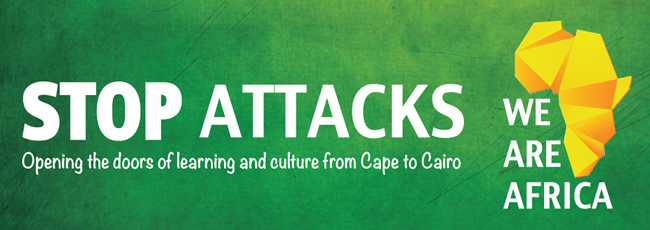
The South African Government condemns in the strongest possible terms the recent outbreak of violent attacks in parts of the country against foreign nationals, particularly fellow Africans from various African countries.
The South African Government views the attacks on foreign nationals as a criminal offence that will not be tolerated. South Africa is a constitutional democracy governed by laws. Everyone working and living in the country must obey its laws in their totality. No one has the right to take the law into their own hands. The South African Government will enforce the laws of the country and will not hesitate to act against criminal activity or those found to incite violence.
South Africa’s transition to democracy was one of the world’s most iconic testimonies of tolerance and peaceful co-existence. Under the stewardship of Nelson Mandela the country had an unwavering dedication to democracy, selflessness, reconciliation, service to humanity and a better life for all.
The recent attacks on foreign nationals are a threat to our historical achievements as a nation. Moreover, the attacks go against the democratic values enshrined in the Constitution.
Attacks against foreign nationals since the start of the year were reported in Soweto, Benoni, Atteridgeville, Khayelitsha, Inanda and KwaDukuza. The situation has been recently worsened following the death of three foreign nationals on 9 April 2015 in Chatsworth and Umlazi in Durban.
The South African Government has thus far (18 April 2015) responded as follows to this matter:
- President Jacob Zuma cancels his state visit to Indonesia. He visits displaced foreign nationals in Chatsworth and also the community of Umlazi in Durban on 18 April 2015.
- President Jacob Zuma has on a number of occasions provided his leadership on this matter by publicly condemning the unwarranted violent attacks on foreign nationals and the looting of their businesses. President Zuma also appealed for calm and tolerance across the country. The most recent of these statements by President Zuma were issued at the National Assembly meeting at Parliament on 17 April 2015.
- President Zuma has assigned the Ministers of Home Affairs (Mr Malusi Gigaba), Police (Mr Nathi Nhleko) and State Security (Mr David Mahlobo) to stop the violence that has broken out in parts of the country particularly in the KwaZulu-Natal (KZN) in some Durban residential areas. This includes the establishment of an Inter-Departmental Task Team to coordinate the response.
- A Panel of Experts has been set up under the leadership of the former United Nations High Commissioner for Human Rights, Judge Navi Pillay. Its purpose is to advise the Government on the integration of foreigners into the local communities on an ongoing basis.
- Additional law enforcement officers have been mobilised from around the country and deployed to the affected areas to enforce the law and prevent further attacks.
- Thus far, a number of suspects have been arrested.
- All district disaster management centres have been placed on high-alert. A 24-hour call centre has been established and remains accessible in the event that further attacks of this nature occur in the future.
- Shelters have been set up to accommodate displaced foreign nationals and basic amenities such as water, sanitation, and healthcare are being provided.
- The South African government is working closely with the United Nations High Commissioner for Refugees (UNHCR), United Nations Children’s Fund (UNICEF), International Organisation for Migration (IOM), as well as non-governmental organisations to provide food, psycho-social and other support to those affected.
- The process of reintegrating those who were displaced back into their communities has begun.
- The Ministry of Small Business Development will fast-track the implementation of the National Informal Business Upliftment Strategy (NIBUS) as part of addressing the concerns and challenges that face the informal business sector. NIBUS is based on three key pillars, namely skills development among the South African population, exploring partnerships between locals and foreign traders and reviewing policies and regulations.
- Community engagements are being conducted through the Communities in Dialogue programme, community safety forums, ward committees, and through community development workers, amongst others.
News articles
Speeches and statements
- Minister Maite Nkoana-Mashabane: Address to Ambassadors and High Commissioners from African Countries on attacks against Foreign nationals, 17 April 2015
- Minister Maite Nkoana-Mashabane: Media briefing following meeting with Ambassadors and High Commissioners from African countries, 17 Apr 2015
- Minister Lindiwe Sisulu on fight against xenophobic violence, 17 April 2015
- Minister Malusi Gigaba: Debate on outbreak of violence against foreign nationals, 17 April 2015
- Parliament condemns violence against foreign nationals, 16 April 2015
- President Jacob Zuma: KwaZulu-Natal violence against foreign nationals, 16 April 2015
- Commissioner Riah Phiyega on activation of joint operation centres, 16 April 2015
- Statement on Cabinet meeting of 15 April 2015, 16 April 2015


